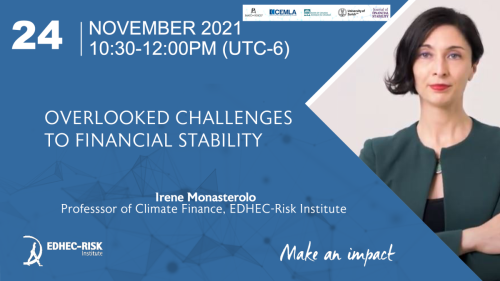IV Conference on Financial Stability
Presentation
Banco de México, CEMLA, the Bank of Canada and the University of Zürich together with the Journal of Financial Stability continue with the series of biennial conferences presenting novel research on financial stability.
Since the aftermath of the Global Financial Crisis (GFC), financial stability has become an all-important duty for regulators. In order to improve resiliency of the financial system, central banks and other financial authorities required to design and implement a series of appropriate policies and to develop some new analytical tools. These advances are known as macroprudential tools and systemic risk analytics.
Macroprudential policies rolled out after the GFC have had a real test during the recent COVID-19 health crisis. Consequently, a review of their performance, robustness and identification of new challenges during the pandemic and in the recovery phase is necessary.

Network and stress testing models have proven to be useful to better understand systemic risk. These approaches have been applied to study the transmission of shocks in the economy, to understand and detect new threats to financial stability and to design and assess policy responses to make the system more resilient. Uncertainty related to climate change and to the COVID-19 pandemic shock that hit the economy and the financial system renders those modelling approaches even more relevant to assess structural vulnerabilities in the financial system.
The conference aims to bring together policymakers and academics, as well as industry representatives, to examine structural changes in the financial system precipitated by the 2020 COVID pandemic, to assess progress in designing a safer financial system, to study intended and unintended consequences of regulation on the global financial system, and to explore recent methodological advances in measuring and controlling risk in the interconnected financial system.
Further information on the conference can be found on the Center for Latin American Monetary Studies (CEMLA) and the Banco de Mexico websites.
Irene Monasterolo, Professor of Climate Finance, EDHEC-Risk Institute, will participate in the Overlooked challenges to financial stability panel session, together with:
- Chair: Miguel Molico, Senior Director, Climate Analysis Team in the Financial Stability Department (FSD), Bank of Canada
- Discussant: Serafín Martínez-Jaramillo, Board Advisor, CEMLA and Manager, Banco de México
Irene will present her recent paper "Assessing the double materiality of climate-related financial risks: an application to the EU economy and banking sector".
In this paper, co-authored with Régis Gourdel, European Central Bank (ECB); Nepomuk Dunz, WU Vienna; World Bank; Andrea Mazzocchetti, Ca' Foscari University of Venice and Laura Parisi, European Central Bank (ECB), she assesses climate physical and transition risks in the European Union using the EIRIN Stock-Flow Consistent behavioral model. By tailoring the EIRIN SFC model, she quantitatively assesses the feedback from banks’ expectations about investment risk across NGFS scenarios and risk internalization (i.e. their climate sentiments), on:
(i) firms’ capital costs and performance,
(ii) the decarbonization of the economy and banks’ lending portfolios, and
(iii) the realization of climate mitigation scenarios.
The results highlight the importance for financial supervisors to consider the role of investors’ expectations in the finance-economy-climate feedback, in order to design appropriate macroprudential policies for tackling climate risks.



